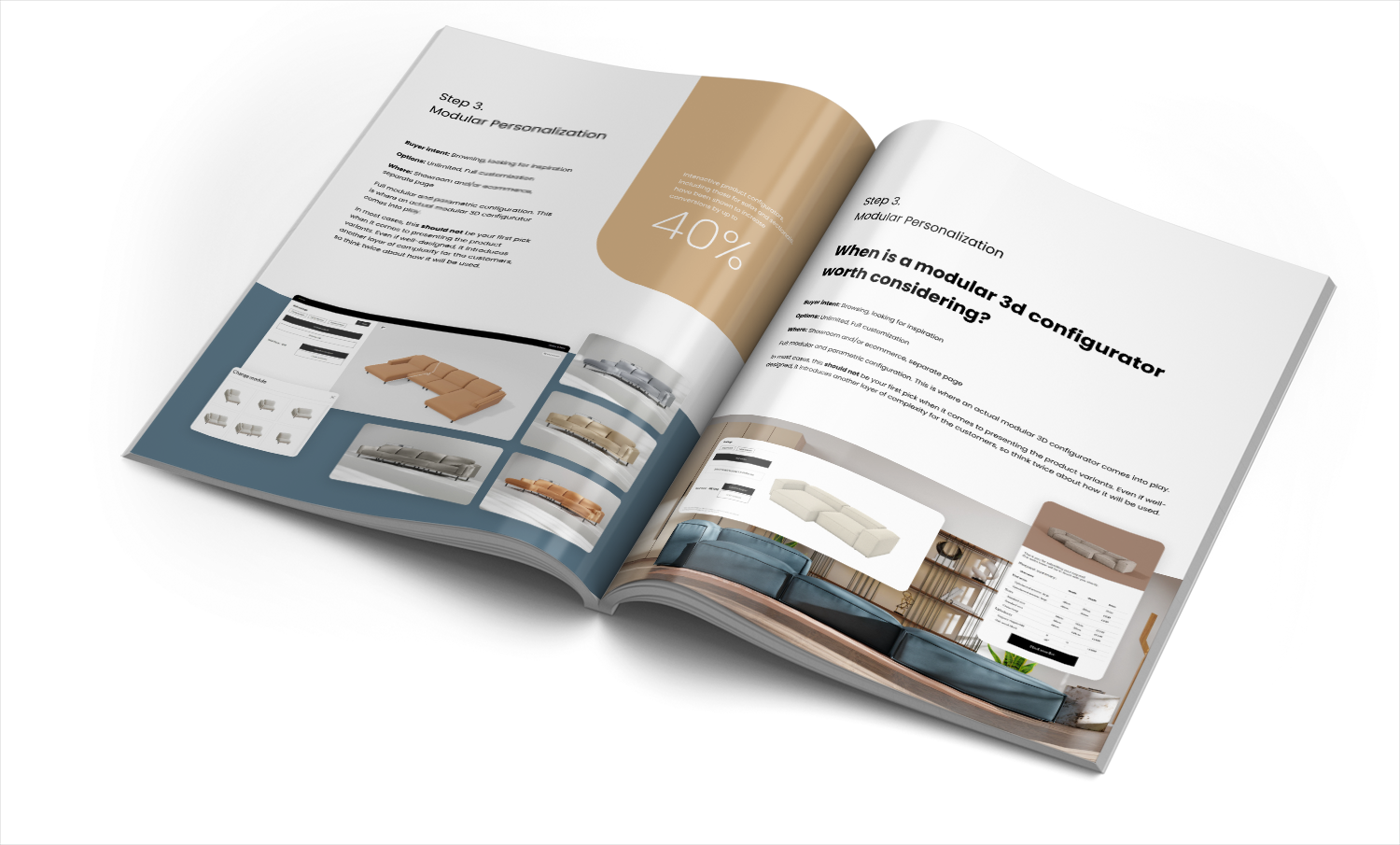The Ultimate 2025 Sofa Configuration Guide
Get your free copy todayy!

The issue isn’t just the price tag—it’s the customer experience leading up to it. Buyers expect evidence of value, personalization, and confidence before agreeing to higher margins. Here’s how a modern product configurator transforms price skepticism into a clear case for premium value—and drives sales without discounting.
Customers often balk at premium furniture prices because they don’t see what makes the product worth more. Vague descriptions and static catalogs fail to communicate the value behind craftsmanship, custom materials, or modular features.
A 3D configurator becomes a live showroom in the customer’s hands. It visually walks them through every design choice—finishes, fabrics, sizes—showing how each decision impacts the final price in real time. This transparency means customers aren’t surprised by cost. Instead, they understand exactly what they’re paying for and why, reducing objections and filtering out price-sensitive browsers before they ever hit “contact us.” Typical brands see a 20–40% increase in online conversion rates after introducing a visual CPQ system.
Premium brands can’t afford to let sales reps act as just order-takers or, worse, habitual discounters. Manual quoting, endless variant explanations, and lack of visuals undermine authority and trust. In showrooms, this translates to long sales cycles and unnecessary price negotiations.
With a 3D CPQ configurator, reps can guide customers through a consultative, interactive process. Live visualization and real-time pricing allow them to focus on unique upgrades and tailored configurations instead of spreadsheets or catalogs. The result? Fewer errors, tangible proof of value, and faster commitment. The configurator presents every option and cost—your team builds trust and closes the deal with confidence. Learn how sales reps can use the configurator in client meetings to boost effectiveness. Also consider should sales teams be able to edit or override configurations to maintain flexibility without compromising margins.
| Sales Process Issue | Manual Flow | With 3D Configurator |
|---|---|---|
| Price Justification | Weak | Visual, data-backed |
| Sales Cycle Length | Slow | 30–50% faster |
| Rep Focus | Discounting | Upselling, consultation |
| Order Accuracy | Error-prone | Automated, production ready |
In a crowded market, premium brands must show distinction fast. But if quoting takes days and customization options are buried in PDFs or phone calls, the perceived value vanishes. Online shoppers especially want speed and clarity at every touchpoint.
A modern configurator delivers instant price quotes, 3D visuals, and even AR previews, turning your quoting process into a competitive advantage. Instead of waiting a week for renderings, prospects can compare multiple high-end scenarios within minutes. This speed and visual assurance position your offer as premium—not just in product quality, but in customer experience. Discover how instant pricing transparency matters so much in personalization and how configurators reduce cart abandonment by giving customers clear, immediate feedback.
Under pressure to close deals quickly, traditional sales teams often discount blindly, eroding margins on even your best products. Without an integrated pricing logic, customizations can introduce costly inefficiencies or errors in material planning.
A configurator with live data integrations (CAD/CAM, ERP, nesting software) provides actionable insights for smart pricing. Sales reps can see material usage, cost implications, and yield efficiency per configuration. It empowers them to offer margin-safe, data-backed incentives rather than gut-based markdowns. Automation means your premium prices are linked to real value, not wishful thinking. Explore approaches for handling pricing logic in modular product configurators and learn how [integrating configurators with ERP systems](https://www.ar-range.app/solutions/knowledge-base/how-can-a-configurator-inte grate-with-my-erp-system) further strengthens margin control.
Buyers move fluidly between digital research and physical showrooms. If their experience stalls at any point—confusing options online, or a static display in-store—you lose them to competitors offering seamless journeys.
A unified interactive configurator bridges both worlds. Customers can start designing at home, save their configuration, and complete the process in your store. Your sales team can pick up right where the customer left off, using the configurator as a tactile, visual, and consultative tool. This not only enhances trust but demonstrates a level of personalized service that justifies a premium, regardless of channel. Discover how to use the same configurator online and in showrooms for omni-channel consistency and why touchscreen kiosks in showrooms boost in-person engagement.
| Benefit | Impact on Premium Sales |
|---|---|
| Visual personalization | Higher conversion and reduced price objections |
| Instant, accurate pricing | Confidence in value—no sticker shock |
| Faster quote-to-close | Shorter sales cycles and lower acquisition costs |
| Data-driven upselling and pricing | Protected margins, targeted incentives |
| Consistent omni-channel experience | Trust and loyalty among high-value buyers |
Rising production costs and growing customer expectations do not have to yield endless discounting. With the right configurator strategy, you’ll sell at a premium—because your customer sees, understands, and values every customization. Want to see how practical this can be for your furniture line? Schedule a free, 30-minute consultation and let’s tackle your top pricing pain point together—no obligation, just actionable insight.
For further insights on how configurators can differentiate your brand in a crowded market, consider our detailed guide on can a configurator differentiate my brand in a crowded market, and understand the importance of how does visualization affect trust and perceived quality in establishing premium positioning.